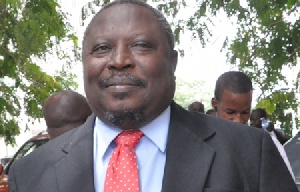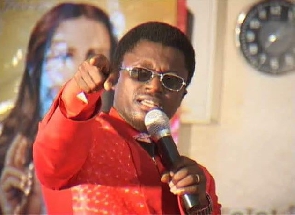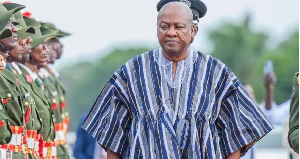Former Attorney General Martin Amidu has said Speaker of Parliament Prof Mike Oquaye and Majority Leader Osei Kyei-Mensah-Bonsu, by their utterances relating to the Special Prosecutor’s Bill and the CID’s probe of three MPs on the Minority side in connection with the controversial $510million AMERI deal, respectively, appear to be undermining President Nana Akufo-Addo’s fight against corruption.
In connection with the Special Prosecutor’s Bill, Prof Oquaye had “cautioned that the President must tread cautiously in the creation of the office” when he met an entourage of the British Minister of State for the Commonwealth and the UN.
“Nevertheless, when you establish a law which clearly provides for another person to prosecute, a circumstance where the Constitution says it is only the Attorney General who can prosecute then we must tread a bit carefully,” Prof Oquaye added.
In relation to the searches conducted at the homes of MPs Dr Kwabena Donkor (Pru East), Mr John Jinapor (Yapei/Kusawgu) and Dr Dominic Ayine (Bolgatanga East), the Speaker, in reply to a plea from the Minority and the MP-suspects that the police were breaching protocols set for probing legislator, said: “We would want to ascertain whether the legal process was followed. I will, soon after sitting, call the appropriate authority to my office and demand that honourable members are handled appropriately, coterminous with their office as honorable members.”
The Majority Leader and Minister of Parliamentary Affairs Kyei-Mensah-Bonsu, according to Mr Amidu, “was reported to have concurred.”
Mr Amidu, therefore, says: “Both the Speaker and the Minister of Parliamentary Affairs forget that the Constitution entrusted the power to execute and enforce the Constitution and the laws of Ghana to a President elected in a national constituency and not to Mr. Speaker or the Minister for Parliamentary Affairs. Any Member of Parliament who thinks his rights under the law or constitution have been violated should go to Court to vindicate those rights.”
On the Special Prosecutor’s Bill which was withdrawn and subsequently re-laid, Mr Amidu wonderd why the Speaker would issue a public caution to the President when he could have done so privately.
“Before the laying of the Bill, the Rt. Hon. Speaker of Parliament, had, like Pontius Pilate, distanced himself from the Bill and any consequences a rush in enacting the Bill would have in the future.
“I wondered what credit or discredit a former Minister, Diplomat and now a Rt. Hon. Speaker and third in line to the Presidency sought to achieve by not coordinating such important observations with the President as part of the principles underpinning the separation of powers doctrine, but to articulate them to his chosen audience. When the core leadership of the political establishment elite, particularly the Ministers of State appointed by the President are incorruptible or minimally incorruptible, then those below are restrained from being corrupt for fear of being mercilessly prosecuted.”
Mr Amidu, in his latest article said it is wrong for anybody to use parliament to run away from punishment. “It is of course against the letter and the spirit of the Constitution to unconstitutionally use Parliament to escape prosecution for suspected crime under the guise of Parliamentary immunity when the situation does not fall under Article 117 of 1992 Constitution. The last few days exposed the conflict between the Executive Authority, which is bent on holding suspected looting Ministers of the past corrupt Government to account and a Legislative Authority using subterfuges to frustrate the President contrary to Article 3 of the Constitution.
“The argument that the Executive must seek the permission of the Speaker before searching the residence of a Member of Parliament suspected of looting as a former Minister is neither covered by the letter nor the spirit of Article 117 of the Constitution. Members of Parliament are shameless when they seek to avoid justice by invoking a non-existing immunity and it is more shameful when the Speaker and the Minister for Parliamentary Affairs seek to appease the rioters and contemnors of the previous day in and out of Parliament by conceding to an otherwise spurious demand.
“President Akufo-Addo is reported on 28th July 2017 to have said at a book launch that: “Government has started comprehensive audits of various institutions and the findings to date reveal the depth of the rot that has almost become the character of the way we treat public resources and the way we perform our public duties and deliver public services.” The President is also reported to have underscored “how corruption undermines the ability of government to create jobs, insisting that ‘a major opportunity for job creation is by dealing with corruption…’” Excellent anti-corruption rhetoric by any standards!
“The letter and spirit of the Constitution is that Honourable Members of Parliament like Caesar’s wife must be above suspicion. One cannot claim the rights of an Honourable Member of Parliament when as a Minister one created suspicion of looting the national purse and deliberately running to Parliament (in anticipation of one’s Government being voted out of office) to escape justice through the subterfuge of immunity.
“And when the Speaker lends his weight to such attempts to obstruct justice by undertaking to find out whether the law has been followed the perception created is that the Speaker seeks to undermine the President’s fight against looting the public purse by present and future Members of Parliament caught up by the law. The Speaker and the Parliamentary Minister have created the impression that there is a mismatch between their perception of who must be investigated and prosecuted for suspected looting of the public purse, and the President’s vision and determination to prevent future looting by fighting corruption within his first four-year term.
“The President was elected with a national mandate to fight corruption. The Speaker and the Minister for Parliamentary Affairs have no national mandate to undermine the President’s executive authority to enforce the law through the instrumentality of his policing and prosecutorial powers. Only the courts of law can contest his authority.
“I campaigned vigorously to the knowledge of every Ghanaian for change of Government because the NDC in whose Government I had served under the 4th Republican Constitution for ten years had become the most irredeemably corrupt Government in Ghana since independence. I will support every President actualising the fight against corruption and oppose any organ of Government perpetrating the status quo of corruption that I campaigned against with all my heart and with all my soul,” Mr Amidu noted.
Below is Mr Amidu’s full article:
THE SPEAKER AND MINISTER FOR PARLIAMENTARY AFFAIRS HAVE NO MANDATE TO EXECUTE AND ENFORCE THE LAWS OF GHANA: BY MARTIN A. B. K. AMIDU
The saying goes that when an ant bites you, it is in your cloth or dress. I repeat that President Nana Akufo-Addo’s anti-corruption fight is being thwarted big time either wittingly or unwittingly by powerful people who have clung to his apron strings to ascend to high political public office in the Executive and Legislature that they never would have ascended to in life.
These are people who at every turn, either wittingly or unwittingly, undermine and frustrate the anti-corruption agenda, what the President stood and stands for, and for which Ghanaians voted massively for him in an unprecedented manner for change on 7th December 2016 against the most corrupt and looting Government in Ghana’s history.
The President has been consistent since assuming office to fulfill robustly his promise not only to fight future corruption by his own appointees, but also to fulfill the mandate given him by the massive voter turnout in his favour demanding accountability from the corrupt government they had just changed. But he is meeting avoidable challenges at every turn.
When the Office of the Special Prosecutor’s Bill, 2017 came to Parliament, I pointed out only one out of several inconsistencies that negated his vision. I am reliably informed that the President instructed that the Bill be withdrawn for reconsideration on account of the smuggled Clause 3(4) but the Minister for Parliamentary Affairs (an appointee of the President) wittingly or unwittingly denied the President the credit and fostered conjectures and claims of victory for the withdrawal of the Bill.
Before the laying of the Bill, the Rt. Hon. Speaker of Parliament, had, like Pontius Pilate, distanced himself from the Bill and any consequences a rush in enacting the Bill would have in the future. The Speaker was reported on the internet to have quoted Article 88 of the 1992 Constitution on the powers and functions of the Attorney General and “cautioned that the President must tread cautiously in the creation of the office” when he was speaking to an entourage of the British Minister of State for the Commonwealth and the UN.
“Nevertheless, when you establish a law which clearly provides for another person to prosecute, a circumstance where the Constitution says it is only the Attorney General who can prosecute then we must tread a bit carefully,” he was reported by Citi FM to have said.
I wondered what credit or discredit a former Minister, Diplomat and now a Rt. Hon. Speaker and third in line to the Presidency sought to achieve by not coordinating such important observations with the President as part of the principles underpinning the separation of powers doctrine, but to articulate them to his chosen audience. When the core leadership of the political establishment elite, particularly the Ministers of State appointed by the President are incorruptible or minimally incorruptible, then those below are restrained from being corrupt for fear of being mercilessly prosecuted.
That was the advantage and lesson of the PNDC and NDC1 Government until the last two years of NDC 2 when political expediency made it impossible to prosecute corruption and allowed the voters to hold Prof. Mills and myself answerable for the inequities of those criminals by casting their votes elsewhere.
President Akufo-Addo knows that he cannot stop his Ministers and other executive appointees from emulating the corruption of the past Government on whose inequities he won the elections without holding the former Ministers and appointees suspected of looting the public purse accountable for their loot. That is why he is making the effort to prosecute those against whom evidence abounds of suspected looting and also warning those of his appointees who have the intention to loot the national purse to get out into the private sector because he does not intend to spare them.
The experience from the last two years of the NDC 2 Government through NPP 2 to NDC4 is that most Ministers who are looters of the national purse know themselves and often seek insurance by spending part of their loot to enter Parliament to obtain group protection as Members of Parliament. Ghanaians know the obstructions Governments through their law enforcement agencies encountered before they could secure convictions of a few past looter Ministers.
It is of course against the letter and the spirit of the Constitution to unconstitutionally use Parliament to escape prosecution for suspected crime under the guise of Parliamentary immunity when the situation does not fall under Article 117 of 1992 Constitution. The last few days exposed the conflict between the Executive Authority, which is bent on holding suspected looting Ministers of the past corrupt Government to account and a Legislative Authority using subterfuges to frustrate the President contrary to Article 3 of the Constitution.
The argument that the Executive must seek the permission of the Speaker before searching the residence of a Member of Parliament suspected of looting as a former Minister is neither covered by the letter nor the spirit of Article 117 of the Constitution. Members of Parliament are shameless when they seek to avoid justice by invoking a non-existing immunity and it is more shameful when the Speaker and the Minister for Parliamentary Affairs seek to appease the rioters and contemnors of the previous day in and out of Parliament by conceding to an otherwise spurious demand.
President Akufo-Addo is reported on 28th July 2017 to have said at a book launch that: “Government has started comprehensive audits of various institutions and the findings to date reveal the depth of the rot that has almost become the character of the way we treat public resources and the way we perform our public duties and deliver public services.” The President is also reported to have underscored “how corruption undermines the ability of government to create jobs, insisting that ‘a major opportunity for job creation is by dealing with corruption…’” Excellent anti-corruption rhetoric by any standards!
The Speaker on the other hand is reported to have said in reply to a plea from the suspected looting Members of Parliament and former Ministers that: “We would want to ascertain whether the legal process was followed. I will, soon after sitting, call the appropriate authority to my office and demand that honourable members are handled appropriately, coterminous with their office as honorable members.”
The Minister for Parliamentary Affairs was reported to have concurred. Both the Speaker and the Minister for Parliamentary Affairs forget that the Constitution entrusted the power to execute and enforce the Constitution and the laws of Ghana to a President elected in a national constituency and not to Mr. Speaker or the Minister for Parliamentary Affairs. Any Member of Parliament who thinks his rights under the law or constitution have been violated should go to Court to vindicate those rights.
The letter and spirit of the Constitution is that Honourable Members of Parliament like Caesar’s wife must be above suspicion. One cannot claim the rights of an Honourable Member of Parliament when as a Minister one created suspicion of looting the national purse and deliberately running to Parliament (in anticipation of one’s Government being voted out of office) to escape justice through the subterfuge of immunity.
And when the Speaker lends his weight to such attempts to obstruct justice by undertaking to find out whether the law has been followed the perception created is that the Speaker seeks to undermine the President’s fight against looting the public purse by present and future Members of Parliament caught up by the law. The Speaker and the Parliamentary Minister have created the impression that there is a mismatch between their perception of who must be investigated and prosecuted for suspected looting of the public purse, and the President’s vision and determination to prevent future looting by fighting corruption within his first four-year term.
The President was elected with a national mandate to fight corruption. The Speaker and the Minister for Parliamentary Affairs have no national mandate to undermine the President’s executive authority to enforce the law through the instrumentality of his policing and prosecutorial powers. Only the courts of law can contest his authority.
I campaigned vigorously to the knowledge of every Ghanaian for change of Government because the NDC in whose Government I had served under the 4th Republican Constitution for ten years had become the most irredeemably corrupt Government in Ghana since independence. I will support every President actualising the fight against corruption and oppose any organ of Government perpetrating the status quo of corruption that I campaigned against with all my heart and with all my soul.
There must be no insurance against investigation for suspected crime under the guise of non-existing immunity just to obstruct the course of justice. I am not sure what the future holds for the war against corruption in Ghana but my views happen to coincide with a view expressed by Linda Ofori-Kwafo, the Executive Director of the Ghana Integrity Initiative (GII), which was reported on the Internet of 18th July 2017: “We are looking forward to a president that can deal with this canker. Some have said if Nana Akufo-Addo fails us in dealing with corruption then Ghana we are dead.” I do not think Ghana will die as such when his own appointees collude in the failure; but the resolution of the war may have to await another avoidable revolution. May God save Ghana from such an experience again!
Martin A. B. K. Amidu (Citizens Vigilance for Justice)
1 st August 2017
General News of Wednesday, 2 August 2017
Source: classfmonline.com













